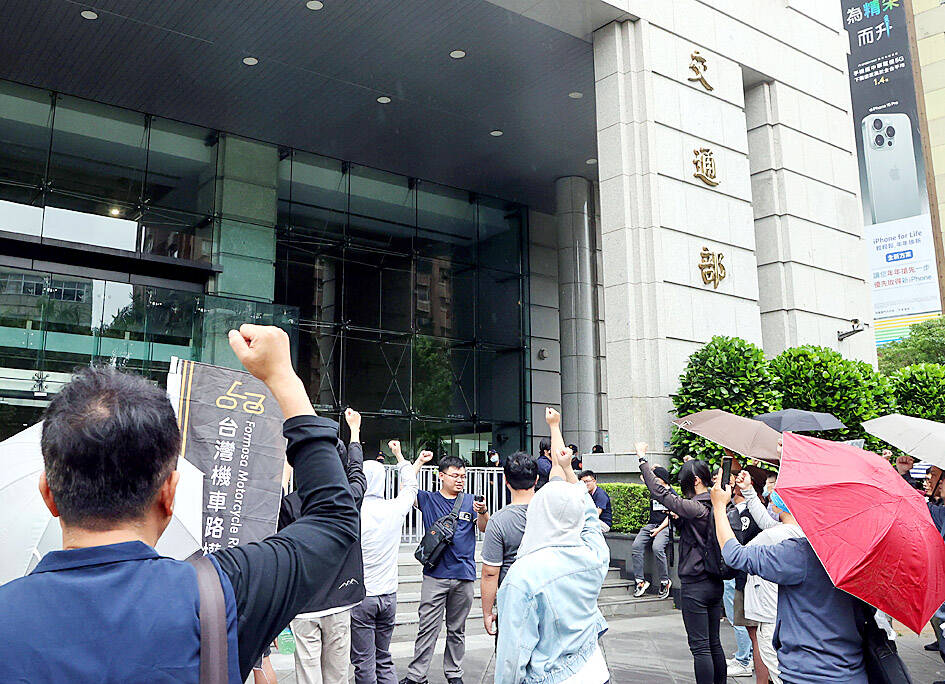Advocates of the rights of motorcycle and scooter riders yesterday protested in front of the Ministry of Transportation and Communications in Taipei, making three demands.
They were joined by 30 passenger vehicles, which surrounded the ministry to make three demands related to traffic regulations — that motorcycles and scooters above 250cc be allowed on highways, that all motorcycles and scooters be allowed on inside lanes, and that driver and rider training programs be reformed.
The ministry said that it has no plans to allow motorcycles on national highways for the time being, and said that motorcycles would be allowed on the inner lanes when the conditions allow.

Photo: CNA
Formosa Motorcycle Rights Association director Lo Yi (羅宜) said lawmakers should repeal various restrictions on motorcyclists stipulated in Article 99 of the Road and Traffic Safety Rules (道路交通安全規則), and should reform driver training to prevent unsafe driving practices that endanger motorcyclists.
“The outer lanes of many roads are used by truck drivers to temporarily park to load and unload goods, so inner lanes should be accessible to motorcyclists,” he said.
Regarding the use of heavy vehicles on national highways, Lo said that the ministry has not produced data showing that the accident rate of large motorcycles on highways is higher than that of passenger vehicles.
The ministry often pits motorcyclists against drivers of passenger vehicles, but many riders of large motorcycles are also drivers who use vehicles to commute to work, he said.
The association chose to surround the ministry with passenger vehicles to show that the rights of both groups overlap, he said.
The ministry said that due to differences in road design and traffic flow characteristics at intersections, local authorities would still be allowed to evaluate and plan lane access for motorcycles and two-stage left-turn control measures based on local conditions.
“It is not reasonable to completely abolish the restrictions on motorcycles and the rules on two-stage left turns,” it said.
Regarding motorcycle access to national highways, the ministry said it had reviewed indicators of safety, orderly riding and rider behavior, and found that behavior had deteriorated over the evaluation period, especially in regard to awareness of safe distances between vehicles.
“There are shortcomings and the public is still not in favor of allowing motorcycles on highways. Therefore, we will wait for improvements and public support before considering opening up highways to large motorcycles,” it said.
Regarding driver training, officials are considering introducing short-term licenses for drivers and riders with repeat and serious traffic violations, it said.
Those whose driving licenses are more than one year old, and whose driving licenses have been suspended for less than one year, would be required to take road safety training and pay fines in accordance with regulations if they wish to continue operating vehicles, it said.
Pending no other serious violations, licenses would be reissued to those individuals in growing intervals — periods of one, two, three and then six years, it added.

Chinese Nationalist Party (KMT) Chairman Eric Chu (朱立倫), spokeswoman Yang Chih-yu (楊智伃) and Legislator Hsieh Lung-chieh (謝龍介) would be summoned by police for questioning for leading an illegal assembly on Thursday evening last week, Minister of the Interior Liu Shyh-fang (劉世芳) said today. The three KMT officials led an assembly outside the Taipei City Prosecutors’ Office, a restricted area where public assembly is not allowed, protesting the questioning of several KMT staff and searches of KMT headquarters and offices in a recall petition forgery case. Chu, Yang and Hsieh are all suspected of contravening the Assembly and Parade Act (集會遊行法) by holding

PRAISE: Japanese visitor Takashi Kubota said the Taiwanese temple architecture images showcased in the AI Art Gallery were the most impressive displays he saw Taiwan does not have an official pavilion at the World Expo in Osaka, Japan, because of its diplomatic predicament, but the government-backed Tech World pavilion is drawing interest with its unique recreations of works by Taiwanese artists. The pavilion features an artificial intelligence (AI)-based art gallery showcasing works of famous Taiwanese artists from the Japanese colonial period using innovative technologies. Among its main simulated displays are Eastern gouache paintings by Chen Chin (陳進), Lin Yu-shan (林玉山) and Kuo Hsueh-hu (郭雪湖), who were the three young Taiwanese painters selected for the East Asian Painting exhibition in 1927. Gouache is a water-based

Taiwan would welcome the return of Honduras as a diplomatic ally if its next president decides to make such a move, Minister of Foreign Affairs Lin Chia-lung (林佳龍) said yesterday. “Of course, we would welcome Honduras if they want to restore diplomatic ties with Taiwan after their elections,” Lin said at a meeting of the legislature’s Foreign Affairs and National Defense Committee, when asked to comment on statements made by two of the three Honduran presidential candidates during the presidential campaign in the Central American country. Taiwan is paying close attention to the region as a whole in the wake of a

OFF-TARGET: More than 30,000 participants were expected to take part in the Games next month, but only 6,550 foreign and 19,400 Taiwanese athletes have registered Taipei city councilors yesterday blasted the organizers of next month’s World Masters Games over sudden timetable and venue changes, which they said have caused thousands of participants to back out of the international sporting event, among other organizational issues. They also cited visa delays and political interference by China as reasons many foreign athletes are requesting refunds for the event, to be held from May 17 to 30. Jointly organized by the Taipei and New Taipei City governments, the games have been rocked by numerous controversies since preparations began in 2020. Taipei City Councilor Lin Yen-feng (林延鳳) said yesterday that new measures by